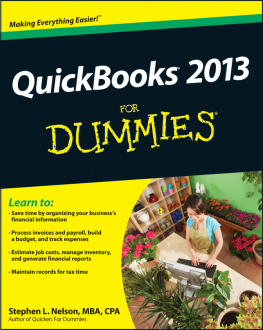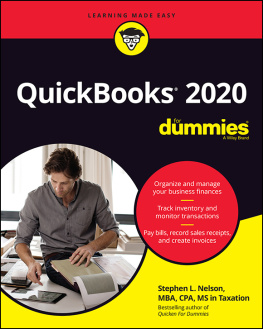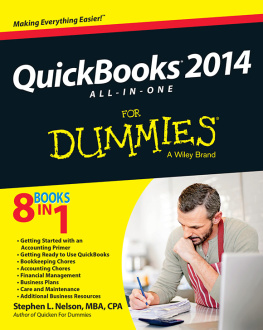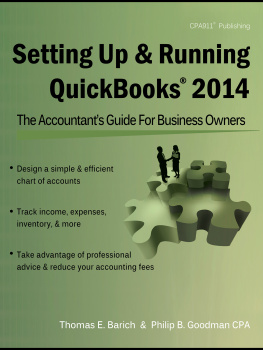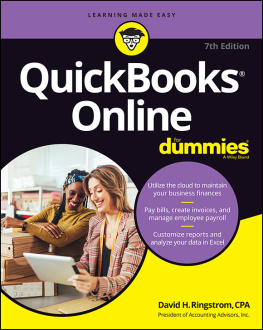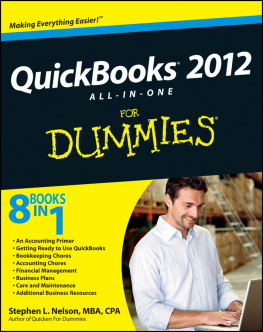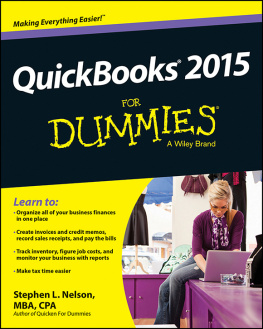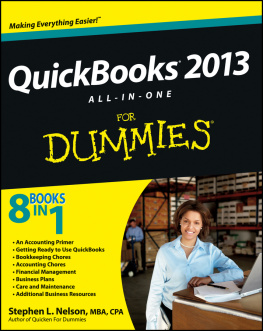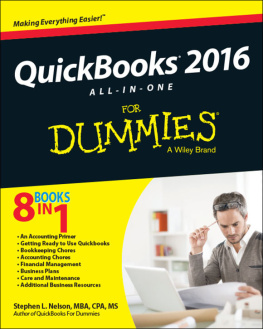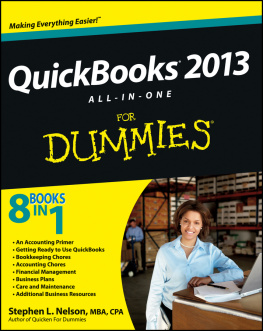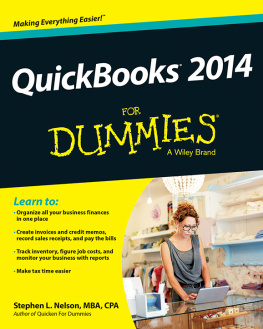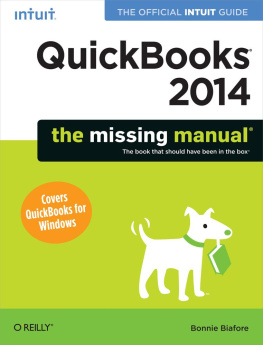Quickbooks
Master Quickbooks in 3 Days and Raise Your Financial IQ. A Beginners Guide to Bookkeeping and Accounting for Small Businesses
By
Abraham Becker
Copyright 2019 by Abraham Becker.
All rights reserved.
This document is geared towards providing exact and reliable information with regard to the topic and issue covered. The publication is sold with the idea that the publisher is not required to render accounting, officially permitted or otherwise qualified services. If advice is necessary, legal or professional, a practiced individual in the profession should be ordered.
-From a Declaration of Principles which was accepted and approved equally by a Committee of the American Bar Association and a Committee of Publishers and Associations.
In no way is it legal to reproduce, copy, or transmit any part of this document in either electronic means or in printed format. Recording of this publication is strictly prohibited, and any storage of this document is not allowed unless with written permission from the publisher. All rights reserved.
The information provided herein is stated to be truthful and consistent, in that any liability, in terms of inattention or otherwise, by any usage or abuse of any policies, processes, or directions contained within is the solitary and utter responsibility of the recipient reader. Under no circumstances will any legal responsibility or blame be held against the publisher for any reparation, damages, or monetary loss due to the information herein, either directly or indirectly.
Respective authors own all copyrights not held by the publisher.
The information herein is offered for informational purposes solely and is universal as so. The presentation of the information is without a contract or any type of guarantee assurance.
The trademarks that are used are without any consent, and the publication of the trademark is without permission or backing by the trademark owner. All trademarks and brands within this book are for clarifying purposes only and are owned by the owners themselves, not affiliated with this document.
Table Of Contents
Chapter One: Why, Quickbooks?

Lets begin with the essential question: Why do you need an accounting system like QuickBooks? It's a reasonable question, so let me supply the two-section answer.
The principal reason is that government law requires your business to keep up an accounting system. All the more explicitly, Section 446 (General Rule for Methods of Accounting) of Title 26 (Internal Revenue Code) of the United States Code necessitates that you have the capacity to register assessable pay by using a type of sound judgment accounting system that plainly reflects salary.
If you choose to brush off this prerequisite all things considered, you got into business so you could lose the shackles of an organization you may pull off your exclusion. In any case, if the Internal Revenue Service (IRS) looks at your arrival, and you disregarded Section 446, the IRS finds a good pace accounting for how it needs. And, the IRS way implies that you make good on additional in charges and that you likewise pay imposes sooner than you would have something else.
Here's the second purpose behind keeping up an accounting system. I kind of go out on an article appendage; however, I will do it in any case. My solid conviction supported by over three many years of business experience and close-hand perceptions of a few hundred business customers is that you can't effectively deal with your business without a not too bad accounting system.
Success requires precisely estimating success or losses and sensibly assessing your budgetary condition.
This subsequent explanation bodes well, isn't that so? If your companion Kenneth doesn't have the foggiest idea when he's creation cash, which items or administrations are productive, and which clients merit keeping (and which aren't), does he truly get an opportunity?
I don't figure he does.
To condense, your business must have a better than average accounting system, regardless of how you feel about accounting and paying little heed to how tedious and costly such a system is or becomes. The law expects you to have such an accounting system. Furthermore, fruitful business management relies upon such an accounting system.
What QuickBooks does
Go on to the following question that you and I have to examine: What does QuickBooks do to assist you with keeping up an accounting system that estimates benefits and misfortunes and other stuff that way?
QuickBooks really makes business accounting simple by giving windows that you use to record regular business transactions. QuickBooks has a window (you know, a Windows window that shows up on your screen) that resembles a check, for instance. To record a check you write, you fill in the spaces of the window with bits of data, for example, the date, sum, and individual or business you're paying.
QuickBooks additionally has a bunch of different windows that you use along these lines. It supplies a receipt window, for instance, that seems as though a receipt you may use to charge a client or customer. You fill in the receipt window's spaces by recording receipt data, for example, the name of the customer or client, receipt sum, and date by which you need to be paid.
Here's the flawless thing about these check and receipt windows: When you record business transactions by filling in the spaces indicated on-screen, you gather the data that QuickBooks needs to set up the reports that condense your success or losses and your financial circumstance.
Your accounting with QuickBooks can be similarly as basic as I describe in the past passages. As it were, if you record only a bunch of business transactions by using the right QuickBooks windows, Such reports can be used to figure benefits or (ugh) misfortunes for a week ago, a month ago, or a year ago. Such reports can likewise be used to compute benefits and misfortunes for specific clients and items.
I know I'm somewhat cruel in the initial segment of this section raising that stuff about the IRS and business failure yet this accounting stuff is flawless!
Great accounting gives you an approach to deal with your business for productivity. Furthermore, clearly, a wide range of good and magnificent things originate from working your business beneficially: a really agreeable life for you and your employees; monetary padding to get you through the extreme fixes; and benefits that can be reinvested in your business, in different organizations, and in-network noble cause.
Let me notice a couple other darn convenient things that QuickBooks (and other accounting systems, as well) accomplish for you, the exhausted entrepreneur or clerk:
Forms: QuickBooks creates, or prints, forms, for example, checks or invoices by using the data you enter in those check windows and receipt windows that I notice prior. With the goal that's slick, and genuine help.
Electronic banking and billing: QuickBooks transmits and recovers some budgetary transaction data electronically. It can email your invoices to clients and customers, for instance. (That can save you both time and cash.) And QuickBooks can share bank accounting data with most significant banks, making it simple to make payments and move reserves electronically.
Why not QuickBooks on the web?
Presently for an ungainly question: Should you use the work area variant of QuickBooks, or do you have to show some signs of life and use the online adaptation of QuickBooks? Great question.








